Minnesota Blues Hall of Fame 2021, Best Performer, acoustic guitar, slide, rack harmonica, vocals, originals, percussion w/cajons, foot bass and highhat playing blues, swing, funk & zydeco ...
Determined and defiant, former Mankatoan Don Scott returns for Blues on Belgrade
By Drew Lyon Special to The Free Press
The Mankato Free Press
Bluesman Don Scott often sings other people's songs, some as old as the blues itself. But suggest that he sings "covers," and Scott is compelled to correct the record with polite firmness.
"'Covers,' to me, gives the music a bad connotation," he said. "It's our version, our rendition of the song. Like, guys I've played with in the past would ask, 'Do you do it this way?'
"No, I don't it that way; I do it my way. Let's do it a little different, other than just copying the song."
Aching to hear another take on "Smoke on the Water" or "Margaritaville" for the millionth time? Don Scott is not your bag. Dig foot-stomping acoustic blues coupled with suggestive, world-weary lyrics? After more than 40 years practicing what he preaches, Don Scott is your mojo man.
"At most (booking) agencies, you had to play 'Smoke on the Water' to be at the agency," Scott said of a period in the 1970s when he was leading the Dust Bowl Blues Band. "I refused. I played what I wanted to play."
Saturday, Scott returns to the river town where he lived throughout the 1970s when he unites with his latest collaborator, Twin Cities harmonica player Curtis Blake, for a performance at the fifth annual Blues on Belgrade in lower North Mankato.
"I still have a lot of friends here," Scott said in a June interview before an acoustic show at the Wine Cafe with Ron Arsenault and Tom "Footy" Husting, two cohorts from his Mankato heyday. "There's a lot of talent here, still a core of people here that haven't gone to the other side yet."
Scott was born and raised in Chatfield in southeastern Minnesota. He first arrived in Mankato in 1965, spending most of his days "drinking beer and playing poker" before leaving to enroll at a junior college in Rochester. It was 1966, and like many of his peers, Scott had other immediate worries on his mind besides academics.
"Rochester was not a good thing for me," he said. "I just quit going to class. I kind of knew in the back of my mind that I'd probably get drafted (in the Army). And that's what happened."
Scott was deployed to Vietnam in 1967, and remained there for more than four months. The day after his 21st birthday, while serving in the war, Scott's life changed forever.
"I got burned on 60 percent of my body," he said. "I went through all that, but never doubted that I would survive, even with the seriousness of the whole thing."
Scott recouped in the hospital for two months, and found solace in his stereo and a John Lee Hooker record. Scott continued his recovery at home before receiving deflating news: He was being sent back to active duty in Fort Knox, Ky.
After "nine months of hell" in Fort Knox, Scott had finally completed his military commitments, and spent time with his sister in Riverside, Calif. before giving Mankato a second chance in summer 1969.
"Being that close to death," he said, "I started living as fast as I could."
Living the blues
Scott first memories of blues music were heard from his sister's record collection. The album that stood out the most, a folk blues compilation (featuring Leadbelly, Josh White and Big Bill Broonzy) called "Three of a Kind," Scott still owns today. During sojourns in California, Scott frequented a local record shop, consuming the latest rock 'n' roll and blues albums.
"I was a big (Rolling) Stones fan," he said. "I was into Taj Mahal, Fleetwood Mac, The Animals. And like all the other kids, I started wondering who's writing all these songs — Willie Dixon, Howlin' Wolf, those guys."
Inspired by Bob Dylan, Scott first strummed a guitar as a teenager, but it wasn't until he moved back to Mankato that he began pursuing the craft in earnest.
"I just gravitated towards the blues," he said. "It hit me on the head."
Scott met a friend at Mankato State, Mike Nelson, who possessed a similar record collection. They found a bassist and a drummer — "because he had a car," Scott says — and formed the Dust Bowl Blues Band.
"In the mid-'70s to late-'70s, we had our Square Deal crowd, and they followed us everywhere," he said. "It was a special time, with a lot of helpful players. We didn't get the lucrative gigs, but at the same token, we played the music we wanted to play."
The Dust Bowl differed from its contemporaries on the 1970s Mankato music scene, Scott says. Other bands might've devoted a song or two a night to the blues, but Scott's outfit was all blues, raw and unadulterated.
"We pretty much educated people around here," he said. "We really pounded them over the head with blues until they thought, 'Oh, this isn't too bad.' After they starting listening and listening to us more, a lot of them liked it."
Scott is candid in describing his condition during that era; he freely admits he was burning both ends of the candle.
"You have to understand," he said, "that after I got out of the army, from '69 to '84, I was drunk, stoned and high every day. Every day. I just learned to play loaded."
Tired after a decade playing smoky bars to declining audiences, Scott left Mankato and moved to Minneapolis in 1982, and started working for his father. Scott was still playing and recording with the Dust Bowl, but a health scare in 1984 led to lifestyle changes.
"I quit drinking for 15 years because my body was telling me I had to stop," he said. "When I sobered up, my guitar playing progressed leaps and bounds immediately, but not without many hours of practice."
After a divorce in 1995, Scott released his first solo acoustic album, "Highway 52," in 1997. Fed up with Minnesota winters, Scott then disbanded the Dust Bowl, bought an RV and hit the road, to Arizona, Los Angeles, New Orleans, North Carolina and Mexico.
"After being burned, I just hate being cold," said Scott, who still spends winters in warmer locales. "I wanted to travel around, too."
In 2008, Scott moved back "out in the sticks" to Chatfield, renewed musical partnerships and started a new one.
He met Curtis Blake in 2011 after Scott played a solo show at the 311 Club in Minneapolis. Within a month, they were blues partners.
"What he wanted to do was what I wanted to do," Scott said. "That acoustic Sonny Terry-Brownie McGee (a legendary folk blues duo) thing. ... Curtis is probably the best harmonica player I've played with."
Scott and Blake recorded a CD, "Sure Thing," which was named "Best Self-Produced CD" by the Minnesota Blues Society. The set features versions — not covers — of standards like "St. James Infirmary," "It Hurts Me Too" and "Basin Street Blues." Scott says he most proud of his original composition, "J.P. Morgan, Citibank, Wells Fargo," a defiant middle finger to the banking industry.
"Yeah, that one pretty much wrote itself," he said. "We do that one quite a bit, and it always gets a reaction."
With blues local festivals like Blues on Belgrade becoming more prevalent, Scott no longer has to educate his audience on the nuances of the music.
"The blues are never going to be popular," he said, "You won't hear it much on the radio. But it's never going away, either. It's always there."
His uncompromising ethos prevailed in the long run. Don Scott still plays what he wants to play, the way he wants to play it.
And he can't remember the last time he was asked to play "Smoke on the Water."
Press
Keynote Speech, Hall of Fame Induction Ceremony
Don Scott’s Induction Into The Minnesota Blues Hall Of Fame, 2021
Keynote Speech by Dave Hunter
When I first heard I was going to do this, Scotty was going to be third.
I’m not a public speaker so when I got here
I popped a pill that would keep me calm but it wore off
[laughter]
so...
Here's the introduction.
Scotty grew up in Fillmore County in southeastern Minnesota. There were no blues in
Fillmore County and they were probably illegal in that Redneck County. Fortunately, a sister
came home from college with some Brubeck and Count Basie and an album called
Three Of A Kind with Leadbelly, Josh White and Big Bill Broonzy,
and this was the album that infected his brain. Mankato is where I lived in 68. There were no
blues in the bars. There were no blues anywhere. Mark Halverson’s wonderful radio
program didn't exist yet. In talking to Mark earlier tonight, he told me that
he used to have to sneak in to hear Scotty play because he wasn't 21.
I didn't know that he was that young or that Scotty and I were that old.
In the bars back then what you had were covers, the Bee Gees all the time
and the Beatles and a lot of shit- kickin country music.
And the closest thing to the blues that you'd ever hear was the Rolling Stones’,
“Satisfaction.” But nobody was doing blue sets until Scotty met Mike Nelson at college
and they started a band, the Dust Bowl Blues Band.
In 1969 and 70 there were these mini Woodstocks out in the country,
out in the hayfields where there'd be multiple bands
and the Dust Bowl always played last. That was at Scotty's request.
Most players wanted to get done to get stoned, you know, but he asked to play
last because he was introducing new music. Like he said, nobody
knew the blues and so he wanted to play long. The Dust Bowl
did play long and sometimes the sun was coming up when he finished
and the dew coming down to the people that were passed out on the ground.
One time the farmer got, I think he was a farmer, got up and said that's it, that's it,
my cows have been awake all night! This has to stop! And Scotty said just one more number
and the farmer said yeah just one more number and then you're done.
Scotty said, Okay boys, John Lee Hooker's “ Endless Boogie.”
And that's what he was doing, he was trying to spread the blues and he has.
He's spread them all over the United States. He's played all over the United States and he's
taken the blues to Ireland and France and Mexico. He's been a true troubadour of the blues.
Don’s played a lot of solo gigs in the past half century but he's had some fine
company too. I can't name all the musicians who passed through the Dust Bowl Blues,
but certainly there was Mike Helson and Kit Kildahl who played with Scotty for years.
Later it was the blues harp virtuoso Curtis Blake.
These days he travels and performs accompanied by Rosanne Liccardi on a variety of exotic
percussion instruments. He's not only carried on the blues, he's added to it.
He's made 8 cds which contain 28 originals, eight of which
are instrumentals and kind of demonstrate the range of the blues.
He has a jump blues, a blues rag
and a samba, a bluesy samba too.
But most people like lyrics and he has a lot of lyrics. There are social commentaries like
Eight Days Of Hell
which is about the time he did in a burn unit after being seriously injured
in our Vietnam war,
Some Other Day
about the treatment of vets at the VA because Bush had to give
a tax break to the rich and he couldn't really support them.
Then there's
JP Morgan, Citibank, Wells Fargo
It's a song about the
ripoff of the public in 2008. Some of you probably remember that. And my favorite,
Say You Don’t Like It
which is such an understated attack on imperialism that I think Randy Newman would be
proud of. And there's the
White Man Still Runs The BIA
the BIA is the Bureau of Indian Affairs, if you don't know, and that's about a
personal visit to a friend on a reservation and seeing the poverty
that still existed there. Of course being blues there has to be those songs about
gambling and rambling like
Sure Thing, Highway 52 and Playing It Cool.
And songs about women because we should start with a different kind of song about
women. There's a song for his mother which is
The Best In Every Way
It’s the one you play every Mother's Day. More songs about women are
Fine New Woman, Dream Baby, and oh there you are Sweet Rosanne.
But in a genre that's got a reputation for chauvinism and misogyny,
we don't find that in Don. All his women songs are love songs. And as I listened to him,
kind of preparing for this, it hit me that all his songs are love songs.
He loves music and even the really nasty, seemingly angry
social protest songs come from a love of justice and peace.
Thank you. I’m about at the end.
He's playing next Saturday at the VFW in
beautiful, downtown Austin. I hope you all come on down there.
See if you can drink the bar dry. We used to be able to do it.
_______________
Don Scott
Thank you, Hunter, I appreciate it. My brother has got all the music I’ve ever recorded over
the past 50 years, so that's why I asked him to do this. I’m humbled beyond belief
to be included in this illustrious group.
i stayed true to the form of this beautiful music
in the 50 years i've been doing it and
there's something about it, there's nothing like the blues because it is the truth.
Brownie McGee, Sonny Terry, Big Bill Broonzy, man all those guys
and I just feel fortunate to be the messenger to pass this music
on. I want to thank all my friends from
Mankato. So without further ado I want to play some music. I’d like to get my wife up here,
Rosanne Licciardi. She’s been playing with me the last seven years.
Alright, let’s play some down-home blues!
[Applause]
Blues Man Paid His Dues, Gets His Dues
(external link)
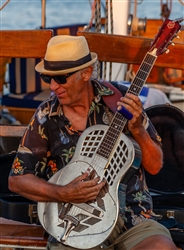
Blues Man Paid His Dues, Gets His Dues: Don Scott inducted into Minnesota Blues Society's Hall of Fame.
By Daniel Vierck Special to The Free Press Dec 25, 2021
Struck with an obsession for blues music at 15 years old, Minnesotan guitarist and singer Don Scott has steadfastly taken the history of blues music and his role as a sort of missionary very seriously.
“Growing up in middle class America in southeast Chatfield (Minn.), there were not even any Black people living in my town. History books had written out a lot of their struggles,” says Scott, who was recently inducted into the Minnesota Blues Society’s Hall of Fame. “Being white and trying to spread this music around in smaller towns and stuff — I didn’t play much in Minneapolis — but being the messenger for this music has been satisfying for me. That’s what we are, you know? Obviously we’re not the creators.”
Scott is a Vietnam veteran who deployed in ‘67 and returned severely wounded with burns on 60% of his body. Out of recovery and after slogging through his military commitments in Kentucky, Scott committed himself to performing, writing and singing.
Scott made his name playing with The Dust Bowl Blues band, which cemented him as a sought-after performer and established him as, at the very least, an honorary Mankatoan.
Michael Baumann, former owner of The Wine Cafe (where Scott regularly performed), remembers that era of Scott’s performances.
“In the 1970s I used to go to The Square Deal bar where the Dust Bowl Blues Band played every year on St. Patrick’s Day (although they were a regular band there),” Baumann says. “Somewhere around 2008 we talked Don into bringing the band back, so I believe it was the Dust Bowl Blues Band’s 34th reunion. The place was so packed you couldn’t get in the front or back door. What was amazing was, I believe every former bar/club owner that was still alive from Mankato showed up from The Hurdy Hurdy (Ron Doty), The Square Deal (Jimmy Lyons), The Burgundy House (Craig Woodward), just to name a few.”
As revered as The Dust Bowl Blues band was, Scott went solo. In the ‘90s he began to travel extensively. He spent significant time in the Mankato area but also lived in Arizona and California, and toured through Europe, Asia and Mexico.
Throughout the next 30 years, he played solo frequently but would partner up here and there and currently plays with percussionist Rosanne Licciardi. While he never went disco or rap-rock, he’s found plenty of room to grow within the blues.
“I branched out to other artists like Etta Baker. She was a purveyor of what they call the ‘Piedmont Style’ of blues. One of her records that really touched me was ‘Railroad Bill,’ which was all instrumental. I started doing some of that stuff. I always like the Chicago stuff. Zydeco music? I like that. Just all the roots of the blues music. And let’s face it, most music — if not all — is based on blues music.”
In October 2021 Don Scott was inducted into The Minnesota Blues Society’s Hall of Fame. Steve Leutgeb, current president of the organization, says that membership dipped through the pandemic but is sitting at about 400 strong and regaining momentum.
“The Minnesota Blues Society has been ‘Keeping the Blues Alive’ since 2002,” Leutgeb says. “Our mission is to preserve, commemorate, educate, celebrate and promote the past, present and future of blues music in Minnesota.”
The organization sponsors a number of programs such as harmonica workshops for kids. They are also an affiliate of the Blues Foundation in Memphis. The Hall of Fame event is their biggest of the year.
Talking about his induction, Scott made special mention of his friend, the late prominent Mankato attorney and blues aficionado, Mark Halverson.
“That accident was a tragedy and I’m still stunned as to what happened there,” Scott says.
“He was instrumental in getting my name considered. He said, ‘Here’s this guy who’s been at it for 50 years playing in places that have never heard the blues before.’ I salute him for that.”
This induction is only Scott’s most recent of many accomplishments. There are Hollywood blockbusters with fewer and less interesting plot points than his life and career (not to mention worse soundtracks), but by all accounts, his perspective is balanced and grounded.
“Being on the same stage as Spider John Koerner? He was inducted the same day I was and he should’ve been inducted a long time ago! The list of the people in that hall of fame is quite illustrious. I feel honored and humbled to be a part of that.”
Blues Man
(external link)
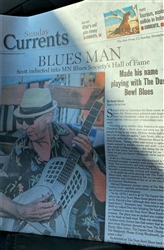
Struck with an obsession for blues music at 15 years old, Minnesotan guitarist and singer Don Scott has steadfastly taken the history of blues music and his role as a sort of missionary very seriously.
“Growing up in middle class America in southeast Chatfield (Minn.), there were not even any Black people living in my town. History books had written out a lot of their struggles,” says Scott, who was recently inducted into the Minnesota Blues Society’s Hall of Fame. “Being white and trying to spread this music around in smaller towns and stuff — I didn’t play much in Minneapolis — but being the messenger for this music has been satisfying for me. That’s what we are, you know? Obviously we’re not the creators.”
Scott is a Vietnam veteran who deployed in ‘67 and returned severely wounded with burns on 60% of his body. Out of recovery and after slogging through his military commitments in Kentucky, Scott committed himself to performing, writing and singing.
Scott made his name playing with The Dust Bowl Blues band, which cemented him as a sought-after performer and established him as, at the very least, an honorary Mankatoan.
Michael Baumann, former owner of The Wine Cafe (where Scott regularly performed), remembers that era of Scott’s performances.
“In the 1970s I used to go to The Square Deal bar where the Dust Bowl Blues Band played every year on St. Patrick’s Day (although they were a regular band there),” Baumann says. “Somewhere around 2008 we talked Don into bringing the band back, so I believe it was the Dust Bowl Blues Band’s 34th reunion. The place was so packed you couldn’t get in the front or back door. What was amazing was, I believe every former bar/club owner that was still alive from Mankato showed up from The Hurdy Hurdy (Ron Doty), The Square Deal (Jimmy Lyons), The Burgundy House (Craig Woodward), just to name a few.”
As revered as The Dust Bowl Blues band was, Scott went solo. In the ‘90s he began to travel extensively. He spent significant time in the Mankato area but also lived in Arizona and California, and toured through Europe, Asia and Mexico.
Throughout the next 30 years, he played solo frequently but would partner up here and there and currently plays with percussionist Rosanne Licciardi. While he never went disco or rap-rock, he’s found plenty of room to grow within the blues.
“I branched out to other artists like Etta Baker. She was a purveyor of what they call the ‘Piedmont Style’ of blues. One of her records that really touched me was ‘Railroad Bill,’ which was all instrumental. I started doing some of that stuff. I always like the Chicago stuff. Zydeco music? I like that. Just all the roots of the blues music. And let’s face it, most music — if not all — is based on blues music.”
In October 2021 Don Scott was inducted into The Minnesota Blues Society’s Hall of Fame. Steve Leutgeb, current president of the organization, says that membership dipped through the pandemic but is sitting at about 400 strong and regaining momentum.
“The Minnesota Blues Society has been ‘Keeping the Blues Alive’ since 2002,” Leutgeb says. “Our mission is to preserve, commemorate, educate, celebrate and promote the past, present and future of blues music in Minnesota.”
The organization sponsors a number of programs such as harmonica workshops for kids. They are also an affiliate of the Blues Foundation in Memphis. The Hall of Fame event is their biggest of the year.
Talking about his induction, Scott made special mention of his friend, the late prominent Mankato attorney and blues aficionado, Mark Halverson.
“That accident was a tragedy and I’m still stunned as to what happened there,” Scott says.
“He was instrumental in getting my name considered. He said, ‘Here’s this guy who’s been at it for 50 years playing in places that have never heard the blues before.’ I salute him for that.”
This induction is only Scott’s most recent of many accomplishments. There are Hollywood blockbusters with fewer and less interesting plot points than his life and career (not to mention worse soundtracks), but by all accounts, his perspective is balanced and grounded.
“Being on the same stage as Spider John Koerner? He was inducted the same day I was and he should’ve been inducted a long time ago! The list of the people in that hall of fame is quite illustrious. I feel honored and humbled to be a part of that.”
Induction Ceremony Brochure
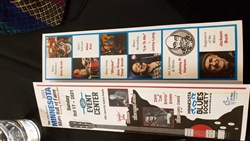
Don Scott--Best Performer, 2021, Minnesota Blues society literature
Saturday, Rocktober 23
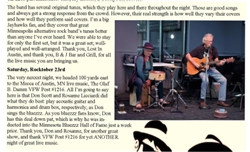
As seen in November Blue Monday Monthly https://www.bluemondaymonthly.com/
Induction Ceremony Literature
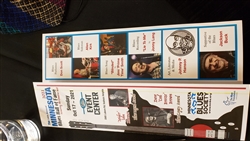
Don Scott inducted into the Minnesota Blues Hall of Fame, 2021
2021 Musician Don Scott to be inducted into the Minnesota Blues Hall of Fame
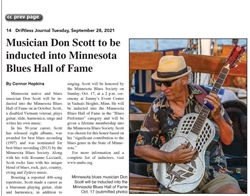
Driftless Journal
2021 Minnesota Blues Hall of Fame Ceremony
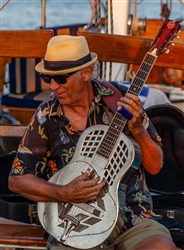
FOR IMMEDIATE RELEASE:
September 7, 2021
CONTACT: Mark Halverson, Director
Co-Chair Hall of Fame Committee
Minnesota Blues Society
507-351-1030
MarkH@mnbs.org
2021 Minnesota Blues Hall of Fame Ceremony
Sunday, October 17, 2021
Jimmy’s Event Center in Vadnais Heights, MN
Music begins at 1:00 p.m.
Ceremony starts at 2:00 p.m.
DON SCOTT, SONGWRITER/VOCALIST/MUSICIAN, TO BE INDUCTED INTO THE MINNESOTA BLUES HALL OF FAME AS “PERFORMER.” ‘SPIDER JOHN’ KOERNER SELECTED TO RECEIVE THE MINNESOTA BLUES HALL OF FAME "LEGEND" AWARD. “LEGACY” AWARD HONORS LATE BAND LEADER/GUITARIST, DAVE ‘COOL BREEZE’ BROWN.
The 14th Annual Minnesota Blues Society’s Blues Hall of Fame Induction ceremony will be held on Sunday, October 17, 2021, at Jimmy’s Event Center in Vadnais Heights, MN. $20 General Admission. $180 VIP Tickets for 6 person tables with Guaranteed Seating. Advance Tickets can be purchased at www.EventBrite.com (Search for "Minnesota Blues Hall of Fame".)
On Sunday, October 17, the ceremony honors and features Minnesota Blues artists/supporters: singer/songwriter/guitarist, Don Scott, in the “Performer” category; drummer, Allen Kirk, as “Sideman;” Music pioneer, ‘Spider John’ Koerner, as “Legend”; Illustrator extraordinaire Johnny P Hanson is receiving “Arts, Literature, Media” honors; Sensation Jonny Lang’s Lie To Me CD takes “Recording” prize; Jimi ‘Prime Time’ Smith is being awarded for his composition, “Blinded” in the “Song” category; and Jackson Buck will receive the “Supportive of the Blues” award. Further, the 2021 Minnesota Blues Hall of Fame “Legacy” tribute will be bestowed upon the family of late band leader/guitarist, Dave ‘Cool Breeze’ Brown.
As part of its mission to preserve, commemorate, educate, celebrate and promote the past, present and future of Blues music in Minnesota, the Minnesota Blues Society, in its 19-year history, has honored, celebrated, and inducted many Minnesota’s great Blues icons, living and passed, who have dedicated 20 or more years of Blues talent into the Minnesota Blues Hall of Fame in at least one of 8 categories; inductees include ‘Lazy’ Bill Lucas, Willie Murphy, George ‘MoJo’ Buford, Auburn ‘Pat’ Hare, Willie Walker, James ‘Cornbread’ Harris, Angelo ‘Milwaukee Slim’ Chambers, Leonard ‘Baby Doo’ Caston, Sonny ‘Cat Daddy’ Rodgers, Percy Strother, Jimi ‘Prime Time’ Smith, Tony Glover, Bruce McCabe, John Beach, Barbara LeShoure, John Koerner, Pat Hayes, John Franken, Curtis Obeda, Curtis Blake, Jeremy Johnson, Willie Walker, Donald ‘Hye Pockets’ Robertson, Joe Juliano, Paul Mayasich, Steve ‘Boom Boom’ Vonderharr, Wilbur Cole, RJ Mischo, Big Walter Smith, Big John Dickerson, Big George Jackson, Laverne ‘Lady Blue’ Johnson, and Bobby Johnson.
COVID POLICY: Staff, guests, and performers will be required to show proof of vaccination OR a negative COVID test within 72 hours of doors opening. Patrons will be asked to show their valid vaccination card or negative test results (clear photocopy or digital photo is permissible) when they arrive at the door for entry. Masks will be worn by staff at all times and will be required of all attendees when not eating and drinking — regardless of vaccination status. Children under the age of 12 must present proof of negative COVID-19 test taken within 72 hours to enter.
Please visit: Minnesota Blues Hall of Fame Online
________________________________________
The Minnesota Blues Society is a 501(c)(3) non-profit organization founded in August 2002. If you would like to help sponsor the Minnesota Blues Hall of Fame, please contact Mark Halverson, Co-Chair Minnesota Blues Hall of Fame Ceremony at 507-351-1030 or markh@mnbs.org
Don Scott – Slidin’ Sideways | Album Review
(external link)
Don Scott - Slidin’ Sideways
Self Release
www.donscottblues.com
10 tracks / 40:31
Minnesotan Don Scott has been playing the blues for five decades, and his current blend of roots and blues is unique as it brings the music down to its most basic levels. He has toured the world, both as a solo artist and with numerous bands that include the Dust Bowl Blues Band (a founding member!), Lazy Bill Lucas, Mighty Joe Young, and the magnificent Janiva Magness.
Over the years, Don has cut six CDs, the latest of which is Slidin’ Sideways. This is a cool release with six originals, four covers and the bare minimum of instrumentation. Scott takes on the vocals and guitars, with pianist Raul Altamirano joining in on a few tracks. So, there are no drums, bass, keyboards, or harmonica to be found and because of this, these arrangements wind up with a raw roots mood and sound.
This ten-song set is book-ended by live tracks that Scott and Altamirano recorded at Loot in Zihuatanejo, Mexico. This beach town is the perfect setting for Don’s kind of blues, and he kicks off the album with the title track, an original instrumental. He cranks out five minutes of righteous slide work on his National guitar as Raul adds a bit of his best honkytonk. And the set finishes up with Willie Dixon’s “Wang Dang Doodle” which gives Raul a bit more room to stretch his legs as Scott belts out the vocals.
The standout cut on Slidin’ Sideways is “Some Other Day,” a song about the plight of the modern soldier. Scott plays a heavy Spanish guitar under heart-wrenching lyrics of how much more we should be doing for those that have given so much of themselves to our country. This song is followed up by the jaunty “Blue Blake Rag,” which is a jolting transition. Don does some amazing guitar work on this one over the steady beat provided by Raul’s hammering left hand.
The roundup of covers is pretty cool, and they include cool stuff like Eddie “Cleanhead” Vinson’s “Kidney Stew,” and Roosevelt Sykes’ “Persimmon Pie” (how risqué!). But the coolest of these is Bob Wills & His Texas Playboys’ “My Shoes Keep Walkin’ Back to You,” which has also been done very well by Ray Price, Johnny Cash, and Elvis Costello. This is heady company and Don Scott holds his own with just his hard-hitting guitar to back up his plaintive wails of loneliness.
You will find that all of the songs are neat and Don Scott has talent galore that translates into a wonderful live show. It would be a great idea to head over to his website to check his gig schedule, as he gets all over the country. There are gigs in six states from Arizona to New York on his schedule right now, and you can be sure that more will be added soon.
Blues Blast Magazine
Self released
www.donscotblues.com
www.harmonicacurtisblake.com
13 tracks
Don and Curtis apparently met a few years ago at a club in Minneapolis and claim they hit it off immediately. Recorded in 2011 live in the studio with no over dubs or voice overs, they are a very interesting duo that plays in the style of Sonny Terry and Brownie McGhee. These guys are middle aged Minnesota natives who are dead serious about their love for the blues.
There are two originals by Scott here and 11 nice covers. Train songs and harp players- you have to love them when they are done well and “Down at the Depot” is one of them. Scott picks furiously and Blake blows some wicked harp as they wind down the tracks and into the depot. “Doggin’ Blues” is a nice little Blind Boy Fuller cut where Blake bends some notes so hard that you’d think they would break.
Tommy Johnson’s “Big Road Blues” is peppy and uptempo and is another well done cut. Big Maceo’s “Worried Life Blues” is another standout among a set of tracks that I enjoyed top to bottom. They closed with “St. James Infirmary” and did it justice with a simple style and nice finger picked intro. They are somber and not overdone as they go through this standard- I enjoyed it.
The two originals are “Sure Thing” and “JP Morgan, Citibank and Wells Fargo.” The former is a fun and lamentatious blues about a filly who did not live up to expectations at the track. The latter is a more serious topic where Scott sings about the big banks that own us and everything else as he picks his National Steel guitar. While the topics are at different ends of the spectrum, they are both good and they duo performs admirably.
This is a nice little CD. If you are looking for some acoustic blues with nice guitar work and some well done harp, you should enjoy this one. I did!!
Reviewer Steve Jones is president of the Crossroads Blues Society and is a long standing blues lover. He is a retired Navy commander who served his entire career in nuclear submarines. In addition to working in his civilian career since 1996, he writes for and publishes the bi-monthly newsletter for Crossroads, chairs their music festival and work with their Blues In The Schools program. He resides in Byron, IL.
Abilene Bar & Lounge, Danny Deutsch
"Customers sure loved that Don Scott!"
His Way: Don Scott Returns To Mankato for Belgrade Blues Event
(external link)
Determined and defiant, former Mankatoan Don Scott returns for Blues on Belgrade
By Drew Lyon Special to The Free Press
The Mankato Free Press
Bluesman Don Scott often sings other people's songs, some as old as the blues itself. But suggest that he sings "covers," and Scott is compelled to correct the record with polite firmness.
"'Covers,' to me, gives the music a bad connotation," he said. "It's our version, our rendition of the song. Like, guys I've played with in the past would ask, 'Do you do it this way?'
"No, I don't it that way; I do it my way. Let's do it a little different, other than just copying the song."
Aching to hear another take on "Smoke on the Water" or "Margaritaville" for the millionth time? Don Scott is not your bag. Dig foot-stomping acoustic blues coupled with suggestive, world-weary lyrics? After more than 40 years practicing what he preaches, Don Scott is your mojo man.
"At most (booking) agencies, you had to play 'Smoke on the Water' to be at the agency," Scott said of a period in the 1970s when he was leading the Dust Bowl Blues Band. "I refused. I played what I wanted to play."
Saturday, Scott returns to the river town where he lived throughout the 1970s when he unites with his latest collaborator, Twin Cities harmonica player Curtis Blake, for a performance at the fifth annual Blues on Belgrade in lower North Mankato.
"I still have a lot of friends here," Scott said in a June interview before an acoustic show at the Wine Cafe with Ron Arsenault and Tom "Footy" Husting, two cohorts from his Mankato heyday. "There's a lot of talent here, still a core of people here that haven't gone to the other side yet."
Scott was born and raised in Chatfield in southeastern Minnesota. He first arrived in Mankato in 1965, spending most of his days "drinking beer and playing poker" before leaving to enroll at a junior college in Rochester. It was 1966, and like many of his peers, Scott had other immediate worries on his mind besides academics.
"Rochester was not a good thing for me," he said. "I just quit going to class. I kind of knew in the back of my mind that I'd probably get drafted (in the Army). And that's what happened."
Scott was deployed to Vietnam in 1967, and remained there for more than four months. The day after his 21st birthday, while serving in the war, Scott's life changed forever.
"I got burned on 60 percent of my body," he said. "I went through all that, but never doubted that I would survive, even with the seriousness of the whole thing."
Scott recouped in the hospital for two months, and found solace in his stereo and a John Lee Hooker record. Scott continued his recovery at home before receiving deflating news: He was being sent back to active duty in Fort Knox, Ky.
After "nine months of hell" in Fort Knox, Scott had finally completed his military commitments, and spent time with his sister in Riverside, Calif. before giving Mankato a second chance in summer 1969.
"Being that close to death," he said, "I started living as fast as I could."
Living the blues
Scott first memories of blues music were heard from his sister's record collection. The album that stood out the most, a folk blues compilation (featuring Leadbelly, Josh White and Big Bill Broonzy) called "Three of a Kind," Scott still owns today. During sojourns in California, Scott frequented a local record shop, consuming the latest rock 'n' roll and blues albums.
"I was a big (Rolling) Stones fan," he said. "I was into Taj Mahal, Fleetwood Mac, The Animals. And like all the other kids, I started wondering who's writing all these songs — Willie Dixon, Howlin' Wolf, those guys."
Inspired by Bob Dylan, Scott first strummed a guitar as a teenager, but it wasn't until he moved back to Mankato that he began pursuing the craft in earnest.
"I just gravitated towards the blues," he said. "It hit me on the head."
Scott met a friend at Mankato State, Mike Nelson, who possessed a similar record collection. They found a bassist and a drummer — "because he had a car," Scott says — and formed the Dust Bowl Blues Band.
"In the mid-'70s to late-'70s, we had our Square Deal crowd, and they followed us everywhere," he said. "It was a special time, with a lot of helpful players. We didn't get the lucrative gigs, but at the same token, we played the music we wanted to play."
The Dust Bowl differed from its contemporaries on the 1970s Mankato music scene, Scott says. Other bands might've devoted a song or two a night to the blues, but Scott's outfit was all blues, raw and unadulterated.
"We pretty much educated people around here," he said. "We really pounded them over the head with blues until they thought, 'Oh, this isn't too bad.' After they starting listening and listening to us more, a lot of them liked it."
Scott is candid in describing his condition during that era; he freely admits he was burning both ends of the candle.
"You have to understand," he said, "that after I got out of the army, from '69 to '84, I was drunk, stoned and high every day. Every day. I just learned to play loaded."
Tired after a decade playing smoky bars to declining audiences, Scott left Mankato and moved to Minneapolis in 1982, and started working for his father. Scott was still playing and recording with the Dust Bowl, but a health scare in 1984 led to lifestyle changes.
"I quit drinking for 15 years because my body was telling me I had to stop," he said. "When I sobered up, my guitar playing progressed leaps and bounds immediately, but not without many hours of practice."
After a divorce in 1995, Scott released his first solo acoustic album, "Highway 52," in 1997. Fed up with Minnesota winters, Scott then disbanded the Dust Bowl, bought an RV and hit the road, to Arizona, Los Angeles, New Orleans, North Carolina and Mexico.
"After being burned, I just hate being cold," said Scott, who still spends winters in warmer locales. "I wanted to travel around, too."
In 2008, Scott moved back "out in the sticks" to Chatfield, renewed musical partnerships and started a new one.
He met Curtis Blake in 2011 after Scott played a solo show at the 311 Club in Minneapolis. Within a month, they were blues partners.
"What he wanted to do was what I wanted to do," Scott said. "That acoustic Sonny Terry-Brownie McGee (a legendary folk blues duo) thing. ... Curtis is probably the best harmonica player I've played with."
Scott and Blake recorded a CD, "Sure Thing," which was named "Best Self-Produced CD" by the Minnesota Blues Society. The set features versions — not covers — of standards like "St. James Infirmary," "It Hurts Me Too" and "Basin Street Blues." Scott says he most proud of his original composition, "J.P. Morgan, Citibank, Wells Fargo," a defiant middle finger to the banking industry.
"Yeah, that one pretty much wrote itself," he said. "We do that one quite a bit, and it always gets a reaction."
With blues local festivals like Blues on Belgrade becoming more prevalent, Scott no longer has to educate his audience on the nuances of the music.
"The blues are never going to be popular," he said, "You won't hear it much on the radio. But it's never going away, either. It's always there."
His uncompromising ethos prevailed in the long run. Don Scott still plays what he wants to play, the way he wants to play it.
And he can't remember the last time he was asked to play "Smoke on the Water."
Blues Junction, David Mac
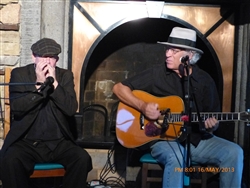
Sure Thing by Don Scott and Curtis Blake is a CD where this talented tandem play songs from the masters like Blind Boy Fuller, Tommy Johnson, Brownie McGhee, John Lee (Sonny Boy 1) for example and juxtapose those tunes against a couple of Don Scott originals. In doing so they put this music in a context that makes this material sound fresh and relevant. This has always been the hallmark of blues music at its finest. By putting their own personal stamp to these classics Scott and Curtis pay homage to their idols and the form itself. Great blues music has a timeless quality and both guitarist and vocalist Scott along with harmonica player Blake seem to have a deep understanding of this concept. Sure Thing is like a beacon that shines a light on the history of the blues and illuminates the road to the future. That light will also warm the heart and soothe the soul in the here and now for anyone who gives this CD a listen.
David Mac / BLUES JUNCTION
The Country Blues
Date: Sat, 22 Dec 2012 15:41:38 -0500
Subject: Re: The Country Blues Submissions: submission
From: matheisf@gmail.com
To: bluesscotty@hotmail.com
Good stuff mate. You deserve to be included in the Who-is-who listing among your musical peers worldwide. Listing goes up in 2013. Cheers, FM
Don Scott & Curtis Blake's, "Sure Thing," Advances To Memphis CD Competition
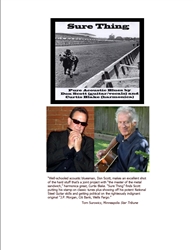
Don Scott & Curtis Blake's, Sure Thing,
Advances To Memphis CD Competition
Sure Thing CD
Congratulations to Don Scott and Curtis Blake. Their CD, "Sure Thing" has been selected by a panel of eleven local judges to advance to the "2013 Best Self-Produced CD" competition at the International Blues Challenge in Memphis, TN. Once again this year, the judges were faced with a difficult decision because the quality of all the Minnesota produced CDs was exceptionally good.
— Jake Jacobson
President, Minnesota Blues Society
Minneapolis Star Tribune, Tom Surowicz
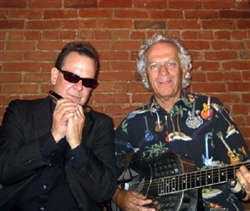
Well-schooled acoustic bluesman Don Scott current release, “Sure Thing,” is an excellent shot at the hard stuff that’s a joint project with “the master of the metal sandwich,” harmonica great Curtis Blake. A swell-sounding session recorded live in studio. “Sure Thing” finds Scott putting his stamp on classic tunes ”Basin Street Blues,” “St. James Infirmary” “It Hurts Me Too,” even Jim Reeves’ “He’ll Have to Go” plus showing off his potent National Steel Guitar skills and getting political on the righteously indignant original, “J.P. Morgan, Citibank, Wells Fargo.”
Tom Surowicz, Minnapolis Star Tribune
Tom Surowicz reviews "Some Other Day"
A rumor in his own time, Don Scott has been quietly playing the blues for nearly four decades in various locales — Tucson, L.A., Paris, Mexico, Brittany and his native Minnesota, of course. He was a big part of the understated and underrated Dust Bowl Blues Band here in the Twin Cities before going solo and relocating to the Southwest, making the occasional CD of blues classics, original tunes and the odd swing jazz piece. Known as Scotty to friends, his latest effort, “Some Other Day,” is tasty and typical, with two Willie McTell songs and other choice covers (Memphis Slim’s “Mother Earth,” T-Bone Walker’s “Here in the Dark”), some irresistible instrumentals (“Blues on Cruise” “For Big Bill”), and a title track that’s a stark protest number about modern war and the treatment of veterans — a tough subject he knows well. It’s nice to have Scott back in our midst once again.
Tom Surowicz, Minneapolis Star Tribune
Sonny Terry, Brownie McGee, T'Bone Walker, Count Basie, Big Bill Broonzy, Etta Baker, Richard " Hacksaw" Harney